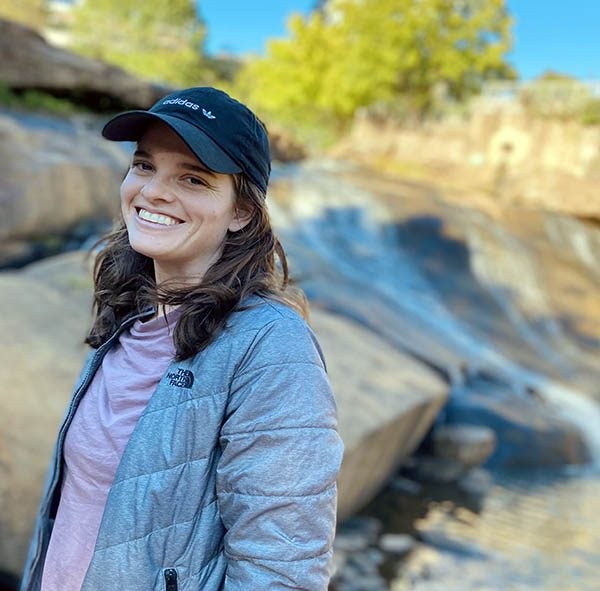Doctoral project models fisheries, food insecurity
Samantha Farquhar, a doctoral student in East Carolina University’s Integrated Coastal Sciences program, will travel to northern Quebec next year to study and model how fisheries relate to food systems in nearby coastal communities. The project is funded through the U.S. Department of Education’s Fulbright-Hays Doctoral Dissertation Research Abroad (DDRA) program and marks the first time an ECU student has received this award.

Samantha Farquhar has been awarded a Fulbright-Hays Doctoral Dissertation Research Abroad fellowship to support a research project in northern Quebec. (Contributed photo)
“What I’m hoping to do is to create a couple different types of models and then link these models together,” Farquhar said. “For example, I would like to make an ecosystem model … to show how the ecosystem responds to different types of fishing. And then it gives you an idea of how many fish will be around after you put in, say five boats, 10 boats.”
Farquhar’s project will take that a step further by exploring the connections between fisheries and food consumption in the nearby communities.
“That’s a little bit more difficult,” she said, “because then you’re talking about people, and people are way more complicated than fish.”
She plans to use an agent-based behavioral model to link people’s behavior with different environmental factors — in this case fish abundance.
“So then you might be able to see how things actually play out along the lines of food, food security and food consumption,” Farquhar said.
For the fisheries and their impact on the ecosystem, she said, there’s a lot of preexisting data, but the data on human behavior she’ll have to work out for herself. She plans to spend time in the Inuit communities of Nunavik, Canada, conducting workshops and exercises with residents to get a sense of behavioral trends and how they relate to food security and consumption. When she’s not in Nunavik, she’ll be working with researchers at Laval University in Quebec City. She’ll also collaborate with the Makivik Corporation, an Inuit development organization that oversees the fisheries.
“I love this project because it is very collaborative and I’m working with communities. … What’s really cool is [these communities] are thinking about developing their own commercial fisheries,” Farquhar said. “But at the same time they have a very strong subsistence food culture; they do a lot of fishing and hunting for their personal consumption. So we want to make sure that the commercial fishing isn’t going to affect their ability to do subsistence harvesting.”
The primary commercial fishery in the area is shrimp, Farquhar said, which is not a dietary staple for the local population. But they rely on Arctic char, a relative of salmon, which does eat shrimp.
“In an ecosystem everything’s connected,” she said. “This is a way to … look at the direct and indirect impacts of commercial fishing and see how it relates to local food. And ideally we’ll find that everything is sustainable and there are no big issues.”
“I am excited for Samantha for getting this grant to support her fieldwork in the Arctic,” said Dr. Nadine Heck, assistant professor in the Department of Coastal Studies and Farquhar’s Ph.D. supervisor. “Her Fulbright DDR award, the first one for ECU and for the ICS Graduate Program, is a well-deserved recognition of her efforts to explore the links between the expansion of commercial fisheries and indigenous food security.”
Farquhar, a Charlotte native, is not a stranger to research abroad, having conducted research in Madagascar as a graduate student at the University of Washington. Before that, she earned her undergraduate degree at UNC Wilmington. She said ECU’s Integrated Coastal Sciences program has provided a great opportunity to further her research.
“It was a win-win for a lot of reasons. It worked out really nicely … to just kind of come together. It’s all about interdisciplinary thinking and problem solving, along with coastal issues,” she said. Of the Outer Banks Campus, where she spent a semester as a residential assistant, she added, “It’s such a beautiful building and probably the best view I’ve ever had from an office.”
The Fulbright-Hays DDRA program provides grants to fund individual doctoral students who conduct research in other countries, in modern foreign languages and area studies for periods of six to 12 months.